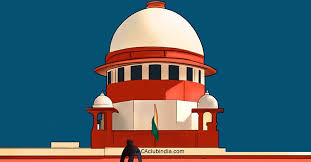(A) Punjab Municipal Corporation Act 1976, Section 38, 60(a) (as extended to the Union Territory of Chandigarh by the Punjab Municipal Corporation Law (Extension to Chandigarh) Act 1994 – Chandigarh Municipal Corporation (Procedure and Conduct of Business) Regulations 1996, Regulation 6(1), (9) to (13) – Constitution of India, Article 142 – Election of Mayor – Challenge as to –Moulding of relief – Presiding Officer made a deliberate effort to deface the eight ballots which were cast in favour of the appellant so as to secure a result at the election by which the eighth respondent would be declared as the elected candidate – Presiding Officer made a solemn statement before Apex Court that he had done so because he found that each of the eight ballots was defaced – Evident that none of the ballots had been defaced – Held that the conduct of the Presiding Officer must be deprecated at two levels – Firstly, by his conduct, he has unlawfully altered the course of the Mayor’s election – Secondly, in making a solemn statement before this Court on 19 February 2024, the Presiding Officer has expressed a patent falsehood, despite a prior warning, for which he must be held accountable – Result, which was declared by Shri ‘A’, the Presiding Officer held to be plainly contrary to law and liable to be set aside – Allowing the entire election process to be set aside would further compound the destruction of fundamental democratic principles which has taken place as a consequence of the conduct of the Presiding Officer – Court is duty-bound, particularly in the context of its jurisdiction under Article 142 of the Constitution, to do complete justice to ensure that the process of electoral democracy is not allowed to be thwarted by such subterfuges – This is not an ordinary case of alleged malpractice by candidates in an election, but electoral misconduct by the presiding officer himself – The brazen nature of the malpractice, visible on camera, makes the situation all the more extraordinary, justifying the invocation of the power of this Court under Article 142 – Each of those eight invalid votes was in fact validly cast in favour of the appellant – Adding the eight invalid votes to the twelve votes which the Presiding Officer recorded to have been polled by the appellant would make his tally twenty votes – The eighth respondent, on the other hand, has polled sixteen votes – Accordingly order and direct that the result of the election as declared by the Presiding Officer shall stand quashed and set aside – The appellant, ‘K’, is declared to be the validly elected candidate for election as Mayor of the Chandigarh Municipal Corporation. (Para 30 to 39)
(B) Criminal Procedure Code, 1973, Section 340 – Punjab Municipal Corporation Act 1976, Section 38, 60(a) (as extended to the Union Territory of Chandigarh by the Punjab Municipal Corporation Law (Extension to Chandigarh) Act 1994 – Chandigarh Municipal Corporation (Procedure and Conduct of Business) Regulations 1996, Regulation 6(1), (9) to (13) – Election of Mayor – Challenge as to – Respondent No. 7 Presiding Officer unlawfully altered the course of the Mayor’s election – Secondly, in making a solemn statement before this Court on 19 February 2024, the Presiding Officer has expressed a patent falsehood, despite a prior warning, for which he must be held accountable – Result, which was declared by Shri ‘A’, the Presiding Officer held to be plainly contrary to law – Held that a fit and proper case is made out for invoking the jurisdiction of this Court under Section 340 of the Code 1973 in respect of the conduct of Shri ‘A’, the Presiding Officer – As Presiding Officer, Shri ‘A’ could not have been unmindful of the consequences of making a statement which, prima facie, appears to be false to his knowledge in the course of judicial proceedings – The Registrar (Judicial) directed to issue a notice to show cause to Shri ‘A’ of the Chandigarh Municipal Corporation who was the Presiding Officer at the election which took place on 30 January 2024, as to why steps should not be initiated against him under Section 340 of the Code 1973. The notice shall be made returnable on 15 March 2024 – Shri ‘A ‘shall have an opportunity to file his response to the notice to be issued in pursuance of the above directions in the meantime. (Para 40 to 42)
SUPREME COURT OF INDIA
2024 STPL(Web) 116 SC
[2024 INSC 129]
Kuldeep Kumar Vs. U.T. Chandigarh And Others
Civil Appeal No. 2874 of 2024 Special Leave Petition (Civil) No 2998 of 2024-Decided on 20-2-2024
https://stpllaw.in/wp-content/uploads/2024/04/2024-STPLWeb-116-SC.pdf







